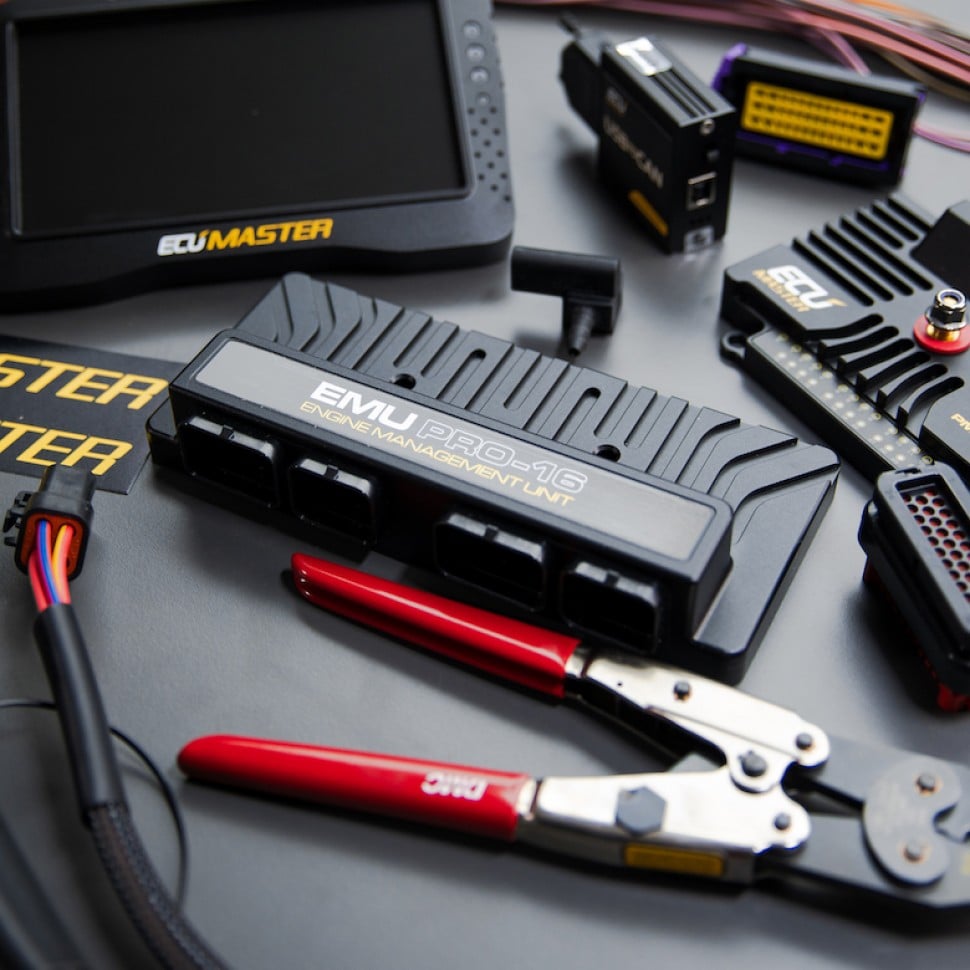| 00:00 |
- We've already discussed that when we get back to basics EFI tuning is all about delivering the correct amount of fuel, and igniting it at the correct point in the engine cycle.
|
| 00:11 |
In order to perform these two tasks, we do need some equipment to do our job accurately.
|
| 00:17 |
As far as measuring the fuel delivery goes, we need to use a wideband air fuel ratio meter to show us what's going on.
|
| 00:26 |
These meters use a wideband oxygen sensor that's placed in the vehicle's exhaust system, and this monitors the composition of the exhaust gases.
|
| 00:35 |
The sensor is connected to a wideband controller that controls the operation of the sensor and then converts the output from the sensor into useful data such as an air fuel ratio or a lambda number.
|
| 00:50 |
There are a variety of wideband products on the market and the right one for you will depend on what you're actually doing.
|
| 00:58 |
For example, if you're considering getting into tuning as a professional, you'd be best to look at a portable wideband meter that you can quickly and easily move from one car to the next.
|
| 01:10 |
These can usually be attached to the windscreen with a suction cup so they can be viewed easily in your peripheral vision while you're driving.
|
| 01:19 |
If on the other hand, you're just interested in tuning your own car, then you'd be better to consider a permanent fit wideband controller that is wired permanently into your car.
|
| 01:31 |
These are cheaper than a portable wideband meter and are available with a digital read out, so that you can view the air fuel ratio data while driving.
|
| 01:41 |
Regardless whether you're going to use a portable wideband meter, or a permanently installed wideband gauge, it's hard to do much accurate tuning based on just glancing at the wideband meter while you're tuning.
|
| 01:55 |
Particularly, if you're tuning on the road, this can be very dangerous, and we need to concentrate our attention on controlling the car rather than watching a gauge.
|
| 02:06 |
The solution is to wire the output of your wideband controller into either the ECU you're tuning, or a data logger.
|
| 02:15 |
This allows you to review the data later and see exactly where in the fuel map the engine is rich or lean.
|
| 02:23 |
This is helpful in making accurate changes to your tuning.
|
| 02:28 |
Optimising or tuning the ignition timing is a little more tricky than the fuel delivery since to get the best results we really need a dyno so that we can see how the engine torque varies as we change the ignition timing.
|
| 02:43 |
Even without a dyno, it's still possible to do a good job of tuning the ignition timing on the road, but regardless where you're doing your tuning you're going to need to be able to monitor the engine for knock.
|
| 02:56 |
Knock, or detonation as it's also known, is a destructive type of abnormal combustion that's the single biggest killer of any performance engine.
|
| 03:08 |
For this reason, monitoring knock while tuning the ignition timing is essential.
|
| 03:14 |
I do this using audio knock detection equipment which consists of a sensor that box to the engine block and a digital signal processor that takes the signal from the sensor and helps to strip away a lot of the background noise from the engine.
|
| 03:30 |
From here, you can audibly listen to the engine while tuning and can hear the distinctive sound of knock occurring.
|
| 03:39 |
I've mentioned dynos already, and obviously they are a key component any time you think of engine tuning.
|
| 03:46 |
However, they also represent a huge investment, and you're not likely to consider buying one if you're just getting started in the tuning world, or perhaps you only want to tune your own car.
|
| 03:59 |
There are still solutions, though, and if you're not in the market for a dyno, I'd suggest talking to your local workshops, and find one who's prepared to rent you dyno time.
|
| 04:10 |
This can be a really cost-effective way of getting great results without a huge financial commitment.
|
| 04:17 |
Since a lot of what we do as tuners requires us to be on the road, dyno, or race track, a laptop computer is another essential item.
|
| 04:27 |
Tuning isn't a particularly intensive process as far as the laptop is concerned, so you don't need the latest or greatest laptop available.
|
| 04:36 |
A basic model, in the $800 to $1000 vicinity will be more than capable of handling any tuning job you could throw at it.
|
| 04:45 |
Tuning can also be quite hard on a laptop and they don't have a very long lifespan in general, so it doesn't make much sense to be spending thousands on an expensive laptop that you may be replacing in 18 months time.
|
| 05:00 |
I would recommend looking for a laptop with at least three USB ports, as these can quickly be used up while tuning.
|
| 05:08 |
It's also worth considering a laptop with a solid-state hard drive, as these are a lot less susceptible to being damaged due to the vibration you can expect to experience in a car.
|





